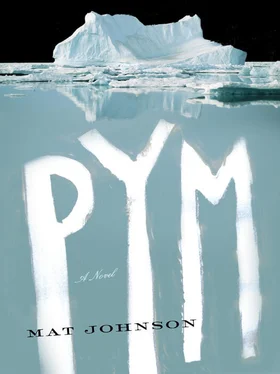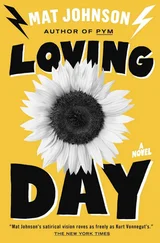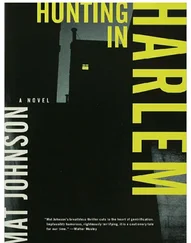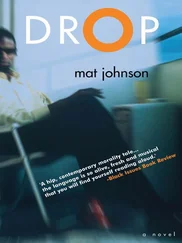We trudged. The building looked like an old church that had lost its faith, every step up the stairs a sacrilege. Garth huffed, but followed. I’d chosen an office in the back of the top floor to dissuade students, but my lectures had done a better job of this. My office was a narrow A-framed cathedral with a matching window. A shrine to the books that lined the walls and my own solitude.
“Bro, I’m not going to lie to you. I got a lot of books in here,” I said, letting him in first.
“You do?” Garth asked me. Because I didn’t.
It was empty. I should have been greeted with the hundreds of colored spines of literary loves, but there was nothing. My books were gone. My office had been cleared out. Everything was gone: my pictures, my lamp, my Persian rug, everything not school property or nailed down, gone. A chasm of vacant whitewashed bookshelves opened up before me.
I was breathless. Garth was out of breath, but for him, it was just all the stairs.
“They took my shit, man. They took my shit,” I kept repeating. I walked over to the desk and pulled out all the drawers. There were some chewed yellow pencils left, and a few folded Post-its and bent paper clips, but that’s not what I was looking for. I kept searching, desperate, sliding pencils and papers around, looking for more.
“Damn, dog. You didn’t have no porn in there, did you?” Garth already had his Little Debbie out and was chewing on it like it was his reward for making it up three floors of nineteenth-century stairs.
“Just a picture,” I told him.
“A picture of what?”
“Angela,” I admitted.
“Worse,” Garth said, head wagging.
I slammed the drawer shut, and it was loud. And I liked that sound, a moment of violence, but this time coming from me. So then I started banging on the empty shelves with my fists, and they vibrated. You could hear the echo in the room, then bouncing off into the empty building beyond us until Garth closed the door.
“That’s wrong, man. Disrespectful. Forget them, job’s over. That’s life, what you going to do?”
I was going to show up at the president’s house and kick his ass, it occurred to me. This act suddenly seemed like the only thing worth running away to Detroit for. I didn’t tell Garth this, because he would have stopped me. He was big enough to fill up the door. He was even bigger since he’d been laid off. I remembered when this man was skinny, ran track. Ran it poorly, but still. It was depressing looking at every extra pound on him, each a reminder that we were both moving swiftly into decline with little else as accomplishment.
“Wait in the car, man. I just have to check my mail,” I told him. Garth did it. I’m a bad liar, but he was tired and it was really cold outside, and brothers don’t like the cold. *It was late spring, but it had been raining for a week and upstate New York was frigid in a way which was more gothic and empiric than the Philly chill we’d grown up with.
“You drunk. I’m tired as all hell. The sooner you get your ass out of here, the sooner you get to get your ass out of here,” Garth offered, but he left. So then I walked over to the president’s house to punch him and maybe kick him a few times too.
In my head, I was getting “gangsta,” which I’ve always felt showed greater intent than getting “gangster” in that it expresses a willful unlawfulness even upon its own linguistic representation. I was going to show him how we do where I’m from, go straight Philly on him, and I knew all about that because, although I had never actually punched someone in the face before, as a child I myself had been on the receiving end of that act several times and was a quick study.
The president’s house was at the other end of the campus, but it was a small liberal arts campus. An empty space, dorms and buildings deserted, solar streetlamps popping on and off for just me. While I was walking, stoking my anger, thinking of all the work I’d done and all that security I was now being denied, I came to the administration building, and I saw that there was a light on. Downstairs, in the back, in the president’s office. No one just left interior lights on, the environmental footprint too massive, the cost too high, and with every attack the prices went even higher. So he was in there. The outside door opened, and I knew he was in there.
And then there was this overwhelming emotion. It was not rage or anger. It was something even more illicit, unwanted. It was hope. Here we were, two men alone. Society vacated, and now just two men and a problem, one that somehow in my stupor seemed workable. There was a guy down the hall, a Romanticist, who had been denied tenure ten years ago. Approved by the faculty committee, just as I was, only to be shot down by the same president in the same manner. And he had, in his grief, approached the all-powerful boss man, and he had repented all of his sins, real and imagined, and was granted a permanent teaching gig. It made sense too, for as Frederick Douglass’s narrative tells us, it is more valuable to a master to have a morally broken slave than to have a confident one. That Romanticist’s story had always seemed humiliating to me before this moment, but suddenly it became inspirational. At the president’s door, I paused, prepared myself for what could be simply the final test before I overcame my troubles. I took a deep breath to prepare for a performance of dignified groveling. Then I heard the music coming from inside.
What I saw scared me. Took me out of my confidence, my momentum. What do you make of a Jew sitting in the dark listening to Wagner in this day and age? I could think of no more call to the end of the world than the one I was looking at. Random violence on the news had become background noise to me at that point, but this scene genuinely scared my ass. Still in his bow tie and tweed jacket at this time of night, it was disgusting. He hit his keyboard quickly, and suddenly the sound became Mahler, but I knew, I knew what I’d heard. As the sound cleansed the room, the bald man just looked at me, drink in hand. As drunk as I was, I could still smell the sweet singe of alcohol hanging in the air.
“My shit!” it came out. It lacked the eloquence of a planned rebuttal, but he understood.
“Packed by movers, delivered to your listed residence. A thank-you, really, for your service. Thank you.” He said the last bit as if I should be saying this to him, but still it robbed me of a bit of my momentum. I had been surviving on righteous indignation and self-pity for weeks, I realized once the supply seemed threatened. But then I remembered I’d been canned and my fuel line kicked in once more.
“Is it because I refused to be on the Diversity Committee?” I demanded. I was loud, the halls were empty. The echo enhanced my argument.
“Well, that certainly would have …,” he began, but seeing that I was hearing every word, already planning my deposition for my discrimination lawsuit, he stopped himself. “Your file was examined as a whole. You were hired to teach African American literature. Not just American literature. You fought that. Simple.”
“So you want the black guy to just teach black books to the white kids.”
“We have a large literature faculty, they can handle the majority of literature. You were retained to purvey the minority perspective. I see nothing wrong with that.” He shrugged, poured a second drink in a second glass and pushed it forward to me with the base of the bottle.
“You have academics going off the farm all the time. Yeats scholars who end up following their way to Proust. You have a film professor who was hired as a German linguist.”
“A Guggenheim, a Fulbright, and a Rhodes scholar. Mr. Jaynes, you … you have accomplished no such honor or distinction. I do not mean that as an insult, just an unfortunate reality.”
Читать дальше












